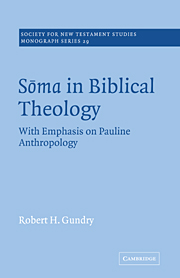Book contents
- Frontmatter
- Contents
- Acknowledgements
- Abbreviations
- PART I FOR AND AGAINST A HOLISTIC DEFINITION OF SŌMA
- PART II SŌMA IN THE FRAMEWORK OF ANTHROPOLOGICAL DUALITY
- 8 Anthropological duality and classical Greek thought
- 9 Anthropological duality in the Judaism of NT times
- 10 Anthropological duality in the NT outside Pauline literature
- 11 Anthropological duality in the OT
- 12 Anthropological duality in Pauline literature
- PART III THE THEOLOGY OF SŌMA AS PHYSICAL BODY
- Select bibliography
- Index of passages cited
- Index of authors
12 - Anthropological duality in Pauline literature
Published online by Cambridge University Press: 14 January 2010
- Frontmatter
- Contents
- Acknowledgements
- Abbreviations
- PART I FOR AND AGAINST A HOLISTIC DEFINITION OF SŌMA
- PART II SŌMA IN THE FRAMEWORK OF ANTHROPOLOGICAL DUALITY
- 8 Anthropological duality and classical Greek thought
- 9 Anthropological duality in the Judaism of NT times
- 10 Anthropological duality in the NT outside Pauline literature
- 11 Anthropological duality in the OT
- 12 Anthropological duality in Pauline literature
- PART III THE THEOLOGY OF SŌMA AS PHYSICAL BODY
- Select bibliography
- Index of passages cited
- Index of authors
Summary
Our question now becomes this: Did Paul forsake the anthropological duality of the other early Christian writers, current Judaistic beliefs, the OT, and Hellenistic thought by going his own way into a monadic view of the human constitution? A negative answer lies in a string of dichotomous passages running through his epistles.
‘Though our outer man is wasting away, yet our inner man is being renewed every day’ (II Cor 4: 16). The contrast between inner man and outer man was native to Hellenistic thought. But unlike Hellenistic thinkers, Paul does not denigrate the outer man as evil or irrational. And the eschatological frame of reference (see the following vv.) contrasts with Hellenistic thinking. Despite these differences, however, Paul makes the same basic distinction between the physical and the non-physical. We might deny this by attaching other meanings to the inner man and the outer man and by making both refer to the indivisible personality seen from within and seen from without. Indivisibility is hard to accept, however, because the outer man even now is passing away while the inner man gains in vigor. Ultimately the inner exists without the outer, or rather, receives a new outer man (5: 1–5).
The attempt to redefine the inner man and the outer man usually runs in the direction of treating the inner man as the ‘new man’ in Christ (Eph 4: 24; Col 3: 10; cf. the corporate new man in Eph 2: 15).
- Type
- Chapter
- Information
- Soma in Biblical TheologyWith Emphasis on Pauline Anthropology, pp. 135 - 156Publisher: Cambridge University PressPrint publication year: 1976



